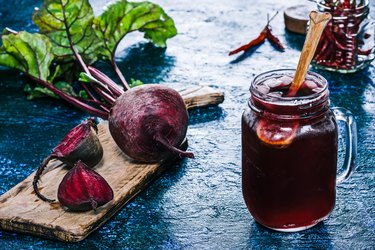
Kefir and kombucha may have the fermented beverage market on lock. But there's another lesser-known bacterial brew — also loaded with probiotics and tasting of funky deliciousness — that's having a renaissance: beet kvass.
What Is Beet Kvass?
Video of the Day
Kvass is a traditional Russian beverage that's been enjoyed for more than a thousand years. It's made by fermenting stale, sourdough-rye bread in a salty brine — a process that adds probiotics and allows the nutrients to be more easily absorbed by the body. To make beet kvass, you simply swap beets for bread; as they ferment, they give off a vibrant, pink-purple color.
Video of the Day
Read more: What Are the Side Effects of Eating Beets?
Have you tried beet juice? Salty and sour, beet kvass is similar and definitely an acquired taste. It can be added to soups (particularly borsht) or added to a vinaigrette dressing for salads. You can also use it as vinegar to cook with or as a bright cocktail mixer. Once you can handle the flavor, sip it straight-up (in small amounts).
Health Benefits of Beet Kvass
Rich in potassium and other nutrients, beet kvass is one of the healthiest beverages a person could enjoy, North Carolina-based dietitian Pamela Schoenfeld, RD, tells LIVESTRONG.com. That's because beets themselves offer nutritional benefits for few calories.
Anti-Inflammatory Properties
Beets are among one of the few vegetables that contain phytonutrients known as betalains, which have strong anti-inflammatory and antioxidant potential and may prove beneficial in the treatment of such conditions as arthritis and cancer, according to an April 2015 study in published in Nutrients.
Potential Heart Health Benefits
Beets also contain other phytonutrients called nitrates, which convert to nitric oxide in the blood and digestive system and are linked to heart health. In a small February 2015 study of 68 participants published in Hypertension, researchers found that drinking nitrate-rich beet juice decreased blood pressure, improved endothelial function (dilation and constriction of the blood vessels) and reduced arterial stiffness.
Beet Kvass as a Post-Workout Drink
Plus, the bright red drink could also prove beneficial if you work out on the reg. "Beet kvass is also rich in potassium and sodium, providing an excellent repletion of electrolytes particularly for athletes or anyone who routinely breaks a sweat," New York City-based dietitian Melissa Rifkin, RD, says.
Beet Kvass May Be Good for Your Gut
Many health and nutrition experts agree that probiotics have health benefits. Both Schoenfeld and Rifkin say that the natural probiotic bacteria in beet kvass can support gut health and digestion.
"The fermentation process locks in nutrients, assisting the body in the promotion of absorbing this nutritive food," Rifkin explains. Probiotics are also believed to help with digestive issues such as constipation, Crohn's disease and lactose intolerance — but there isn't strong scientific evidence to support these claims just yet.
Read more: 13 Surprising and Beneficial Probiotic Foods
However, there is preliminary evidence that some probiotics are helpful in preventing diarrhea caused by infections and antibiotics and in improving symptoms of irritable bowel syndrome (IBS), according to the National Institutes of Health. But because studies are small and inconsistent, there is still uncertainty about the health benefits of probiotics, and the U.S. Food and Drug Administration (FDA) has not approved any probiotics for preventing or treating any health problem.
Warning
One word of caution from Schoenfeld: People following a reduced-sodium diet or who have to limit their intake of oxalates (such as someone with kidney stones) should not drink this beverage.
Beet Kvass Nutritional Information
According to Rifkin, 4 ounces of beet kvass contains: 25 calories, 5 grams carbohydrates (4 grams of sugar and 2 grams of fiber), 602 milligrams of sodium, 1 gram of protein and 93.5 milligrams of potassium.
How to Make Beet Kvass
Ready to make your own probiotic-rich kvass? Schoenfeld shares her simple recipe for brewing beet kvass at home.
Ingredients
- 3/4 pound whole red beets, tops removed
- 1 heaping tablespoon of Celtic salt or another non-iodized salt
- Water (purified is best)
How to Make It
- Peel and cut beets into approximately 1/2-inch cubes.
- Place beets into a 1-quart Mason jar.
- Add salt and water to cover.
- Seal tightly with lid and turn the jar a few times to dissolve the salt.
- Let the jar sit on the kitchen counter for two to three days (longer during the winter or if the kitchen's temperature is below 70°F.) Make sure to place a bowl underneath the jar to collect any fermentation overflow and cover with a towel to block light.
- When the kvass is strong enough to your liking, strain the beets and transfer the liquid to the refrigerator.
You can either drink the beet kvass straight or dilute it by adding it to an athletic recovery drink. After you've strained off the liquid the first time, you may repeat the fermentation process with the beets, adding water again to cover and 1.5 teaspoons of salt. After the second fermentation process, you can cook the beets and use them in salads or as a naturally sweet side dish with your supper — or even snack on them on their own. Beet kvass will last for at least a month, and sometimes longer.
Read more: The Dangers of Juicing Beets